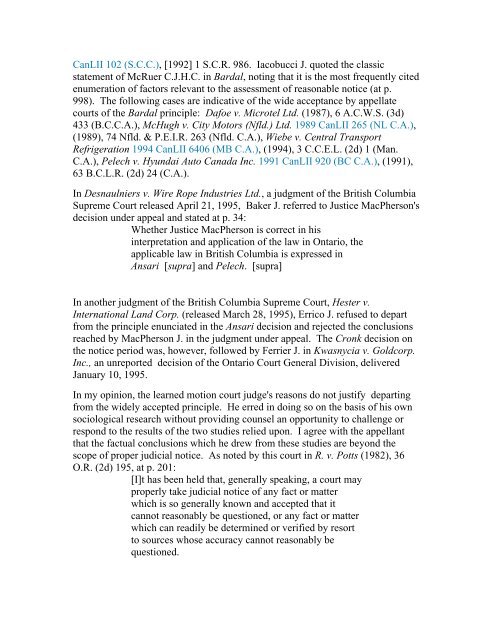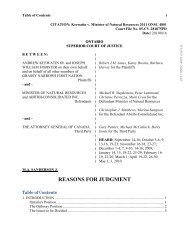Cronk v. Canadian General Insurance Co., 1995 CanLII 814 (ON CA)
Cronk v. Canadian General Insurance Co., 1995 CanLII 814 (ON CA)
Cronk v. Canadian General Insurance Co., 1995 CanLII 814 (ON CA)
Create successful ePaper yourself
Turn your PDF publications into a flip-book with our unique Google optimized e-Paper software.
<strong>CanLII</strong> 102 (S.C.C.), [1992] 1 S.C.R. 986. Iacobucci J. quoted the classic<br />
statement of McRuer C.J.H.C. in Bardal, noting that it is the most frequently cited<br />
enumeration of factors relevant to the assessment of reasonable notice (at p.<br />
998). The following cases are indicative of the wide acceptance by appellate<br />
courts of the Bardal principle: Dafoe v. Microtel Ltd. (1987), 6 A.C.W.S. (3d)<br />
433 (B.C.C.A.), McHugh v. City Motors (Nfld.) Ltd. 1989 <strong>CanLII</strong> 265 (NL C.A.),<br />
(1989), 74 Nfld. & P.E.I.R. 263 (Nfld. C.A.), Wiebe v. Central Transport<br />
Refrigeration 1994 <strong>CanLII</strong> 6406 (MB C.A.), (1994), 3 C.C.E.L. (2d) 1 (Man.<br />
C.A.), Pelech v. Hyundai Auto Canada Inc. 1991 <strong>CanLII</strong> 920 (BC C.A.), (1991),<br />
63 B.C.L.R. (2d) 24 (C.A.).<br />
In Desnaulniers v. Wire Rope Industries Ltd., a judgment of the British <strong>Co</strong>lumbia<br />
Supreme <strong>Co</strong>urt released April 21, <strong>1995</strong>, Baker J. referred to Justice MacPherson's<br />
decision under appeal and stated at p. 34:<br />
Whether Justice MacPherson is correct in his<br />
interpretation and application of the law in Ontario, the<br />
applicable law in British <strong>Co</strong>lumbia is expressed in<br />
Ansari [supra] and Pelech. [supra]<br />
In another judgment of the British <strong>Co</strong>lumbia Supreme <strong>Co</strong>urt, Hester v.<br />
International Land <strong>Co</strong>rp. (released March 28, <strong>1995</strong>), Errico J. refused to depart<br />
from the principle enunciated in the Ansari decision and rejected the conclusions<br />
reached by MacPherson J. in the judgment under appeal. The <strong>Cronk</strong> decision on<br />
the notice period was, however, followed by Ferrier J. in Kwasnycia v. Goldcorp.<br />
Inc., an unreported decision of the Ontario <strong>Co</strong>urt <strong>General</strong> Division, delivered<br />
January 10, <strong>1995</strong>.<br />
In my opinion, the learned motion court judge's reasons do not justify departing<br />
from the widely accepted principle. He erred in doing so on the basis of his own<br />
sociological research without providing counsel an opportunity to challenge or<br />
respond to the results of the two studies relied upon. I agree with the appellant<br />
that the factual conclusions which he drew from these studies are beyond the<br />
scope of proper judicial notice. As noted by this court in R. v. Potts (1982), 36<br />
O.R. (2d) 195, at p. 201:<br />
[I]t has been held that, generally speaking, a court may<br />
properly take judicial notice of any fact or matter<br />
which is so generally known and accepted that it<br />
cannot reasonably be questioned, or any fact or matter<br />
which can readily be determined or verified by resort<br />
to sources whose accuracy cannot reasonably be<br />
questioned.
















